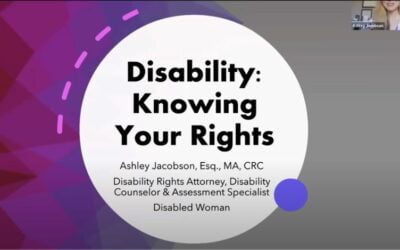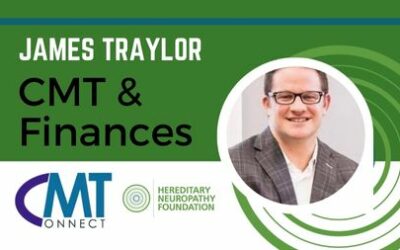Applying for Social Security Disability 101 - CMT THRIVE Summit Webinar
Presented by: Nancy Cavey
The Social Security Administration (SSA) doesn’t make it easy for those with CMT to get the Social Security Disability Benefits they deserve. SSA is denying more initial claims and Requests for Reconsideration claims than ever for CMT. That’s why attorneys like Nancy Cavey work with applicants to provide important guidelines to ensure no details slip through the cracks during the SSA’s 5-Step Sequential Evaluation process.
Know Your Disability Rights - CMT THRIVE Summit Webinar
Presented by: Ashley Jacobson
What are our disability rights at work, school & society in general? When it comes to CMT, learning our rights can seem like a daunting and intimidating endeavor. Thankfully, there are passionate and empathetic Disability attorneys like Ashley Jacobson that help us navigate equality and open the doors to inclusion!
There are many laws that provide protection and support for people with Charcot-Marie-Tooth, from laws that prohibit discrimination to public benefits that provide financial support to children and families.
This information is intended to provide an overview of federal civil rights and public benefits laws that may apply to individuals living with CMT.
This information below was prepared by Kimberly Glassman, an attorney with an expertise in special education and family law, practicing in Maryland. www.kglassmanlaw.com
Americans with Disabilities Act/ADA Amendments Act of 2008 (ADA/ADAAA)
The ADAAA prohibits discrimination against individuals with disabilities, those that have a record of a disability or are regarded as having a disability. A disability is a physical or mental impairment that substantially limits a major life activity. It is applicable in employment, schools (both public and private, so long as the private school receives federal funding), other public entities, and public accommodations. The ADA prohibits discrimination, and requires covered entities to be accessible and to make reasonable accommodations for people with disabilities.
The ADA is enforced by the United States Department of Justice, Equal Employment Opportunity Commission, or Department of Education depending on the situation/issue.
Individuals with Disabilities Education Improvement Act (IDEIA)
The IDEIA ensures that qualifying children receive a FAPE, including special education and related services for the child to benefit educationally and make progress in the general education curriculum. Part C applies to infants and toddlers and Part B applies to children ages 3 to 21.
Under Part C, qualifying infants and toddlers receive an Individual Family Services Plan, which details the early intervention services that are designed to meet the child’s developmental needs. It can include health services, occupational therapy, physical therapy, assistive technology, and/or parent training.
To be eligible for special education services under Part B, the child must be found to have a disability under the IDEIA. This may include a developmental delay (ages 3-9 only), orthopedic impairment, or other health impairment that adversely impacts the child’s educational performance. Once qualified, the child must receive services in accordance with his or her Individualized Education Plan (IEP). An IEP provides the special education and related services that the child needs to receive an educational benefit, including specialized instruction, related services like occupational therapy, physical therapy, and/or adaptive physical education, supplemental aids and services, and program modifications. The IDEIA applies to eligible children even if they are advancing from grade to grade and is applicable to both academic and nonacademic settings, including physical education and vocational education.
The IDEIA provides detailed procedural protections, including the right to file due process to allege denials of FAPE with your State Education Agency.
Social Security Disability Income (SSDI)
SSDI pays benefits to people who can no longer work because they have a medical condition that is expected to last at least one year or result in death. To qualify, the individual must have worked at some point during the three-year period before the disability began.
Section 504 of Rehabilitation Act of 1973
Section 504 of the Rehabilitation Act also prohibits discrimination on the basis of disability in programs that receive federal financial funding, which includes all public and many private schools. The same definitions of disability and major life activity apply as those found in the ADAAA. Section 504 requires that schools provide a Free Appropriate Public Education (FAPE) to children with disabilities. To determine FAPE for an individual child, schools must do a complete evaluation to determine the scope of the child’s educational needs that result from the disability. Section 504 provides accommodations and modifications that allow children to access both academic and nonacademic areas of school, including extracurricular activities, field trips and before and after care, alongside their non-disabled peers. Qualifying children receive a 504 Plan, which outlines the child’s accommodations and services, which may include occupational or physical therapy. It is possible for children to receive a 504 Plan but not qualify for an IEP under the IDEIA. Section 504 is enforced by the United States Department of Education, Office for Civil Rights.
No Child Left Behind (NCLB)
NCLB seeks to ensure that all children have a “fair, equal and significant opportunity to receive a high quality education.” It requires that all groups of children make adequate yearly progress, including children with disabilities, and requires that teachers are highly qualified. Children taking standardized tests required by NCLB are entitled to the accommodations that are set forth in their 504 Plan or IEP. For kids with CMT, this might mean extra time on standardized tests or assistive technology.
Supplemental Security Income (SSI)
SSI is an income supplement program designed to help people with disabilities with little or no income. SSI eligibility depends on wages, unearned income, in-kind income and deemed income, which includes a portion of the income from a spouse or parent with whom the applicant resides.
Children under 18 may qualify for SSI if:
- They are income eligible and
- They have a physical or mental impairment that results in marked and severe functional limitations and
- That impairment has lasted or is expected to last at least 12 months, or is expected to result in death.
Adults may qualify for SSI if:
- They are income eligible adults and
- They have an impairment that results in the inability to do any substantial gainful activity, and
- That impairment can be expected to last for a continuous period of not less than 12 months or can be expected to result in death.
Medicaid Waivers Medicaid
Waivers enables children and adults with significant disabilities to be cared for at home and be eligible for Medicaid based on the individual’s income and assets alone, rather taking into account the income of legally liable relatives. This is an important benefit for children with severe disabilities whose parents earn too much to qualify for Medicaid or SSI. Each state may operate its own waiver program, and the scope of disabilities covered varies by state.
Applying for Social Security Disability 101
The Social Security Administration (SSA) doesn’t make it easy for those with CMT to get the Social Security Disability Benefits they deserve.
Know Your Disability Rights
What are our disability rights at work, school & society in general? When it comes to CMT, learning our rights can seem like a daunting and intimidating endeavor.
CMT & Finances
Disability and financial expert, James Traylor, provided a very informative presentation on the basics of navigating disability benefits and services.
Applying for Disability with Hereditary Neuropathy or CMT
Learn how you can apply for disability with Hereditary Neuropathy or CMT.
Keep Track Of Your Health Information With Medicare’s Blue Button
Medicare is providing better access to your health information with their expanded Blue Button feature.
Key Laws & Benefits
Learn more about key laws and benefits, including the ADAAA, FERPA, and IDEIA.
Social Security Programs for Those with Charcot-Marie-Tooth
Many people think social security benefits are only for the elderly or retired, but social security benefits are also available for people who meet the government’s definition of disability.
Knowledge is Power: Overview of Special Education Law
Strong advocacy for education is often needed to ensure your child receives appropriate accommodations and services for academic success.








